Struggling with traffic? Wishing the Google gods would just NOTICE YOU ALREADY!? Or maybe you just need to find interesting topics for your blog readers?
Either way… If any or all of these apply to you… You’re gonna need to brush up on your keyword research skills.
When we started our blog, we wrote posts based on topics that we believed our readers wanted. We didn’t ask them what they wanted. We didn’t do any keyword research.
Just thought up cool ideas and started writing.
The problem with this is two-fold:
- You’re making assumptions about what your readers want and you could be totally wrong.
- You’re not creating content that is searchable.
Keyword research is SUPER important when you’re creating content because it helps you create content with a purpose.
i.e. Content that people want, need, and are SEARCHING for!
When you choose keywords that people are actively searching for, your content is more likely to be found on search platforms like Google, Pinterest, and YouTube.
So, how do you find these keywords people are searching for?
Well, that’s what this whole article is about! We’ve rounded up some of the BEST keyword research tools and we’ve included both free and paid options!
Honestly, we use a combination of tools when it comes to keyword research because every software is a little different and comes with different capabilities.
The following are in no particular order, so let’s jump right into the 11 best free and paid keyword research tools for bloggers!
Now that you know what the tools are, let’s break them down further, so that you can decide which one (or ones) are right for you.
P.S. Make sure to select AT LEAST one of these keyword research tools to use when you are planning and writing your new blog content!
What are the 11 Best Keyword Research Tools for Bloggers?
Some of the tools below are free and some are paid.
1. Ubersuggest
Ubersuggest is one of my favorite free tools for keyword research because of how SIMPLE it is! It’s a very easy-to-use tool and provides you with some important information without getting too lost in the data overwhelm.
This keyword research tool not only gives you long-tail keyword suggestions but also tells you a percentage of how likely you are to be able to rank for the keyword you type in.
Here is an example of a search for “swing dancing”:
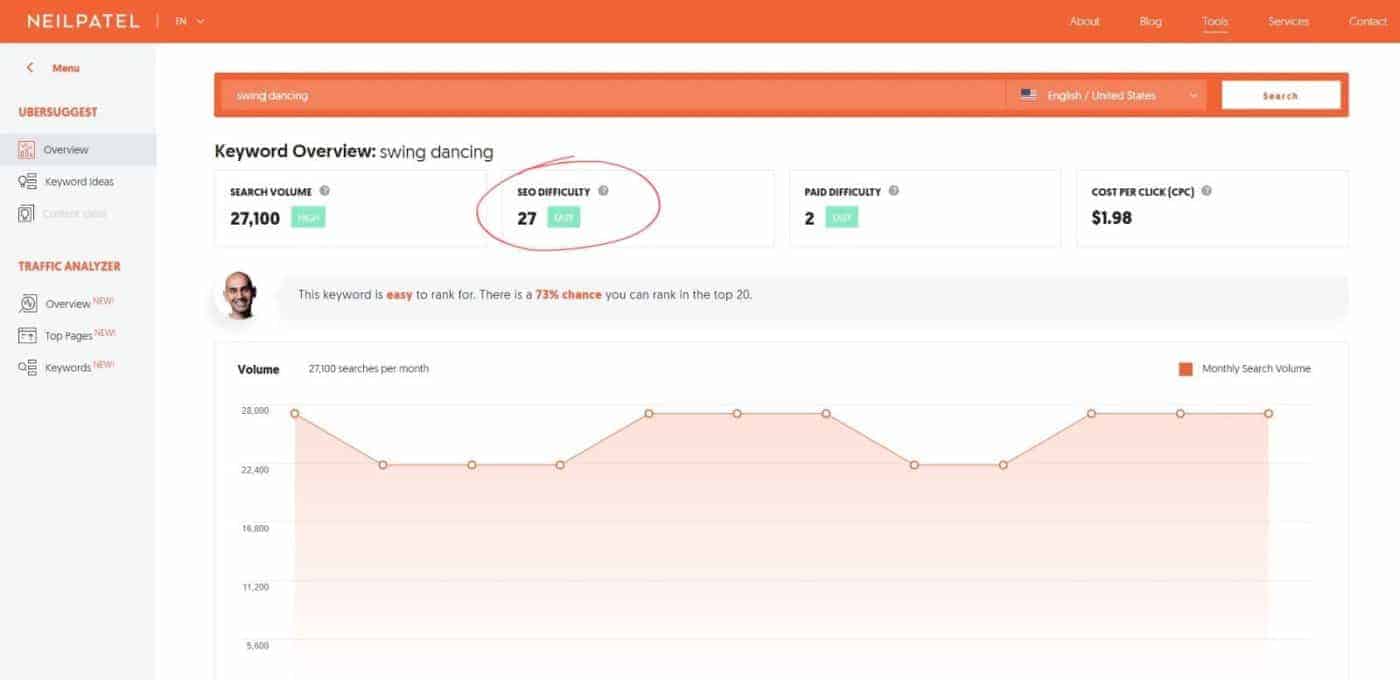
Ubersuggest told me that this keyword is easy to rank for and that there is a 73% chance I can rank in the top 20.
Then, you can click to view more keyword ideas, which gives you some additional information about your keyword, and other websites that are ranking for that particular keyword:
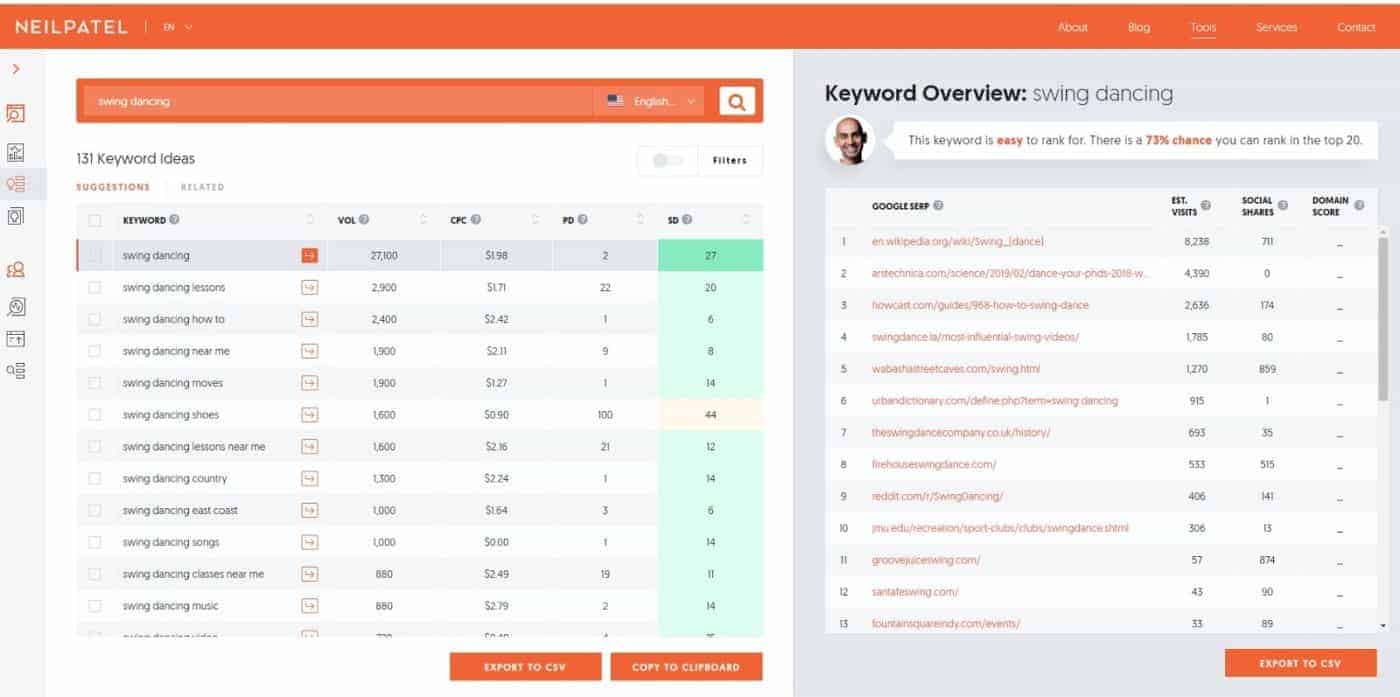
Ubersuggest is an awesome free tool and where I would suggest any beginner blogger on a budget get started! The only thing to keep in mind is that you only get 3 free searches per day, so use them wisely!
2. Ahrefs
With Ahrefs, you also get a LOT more than keyword research. You also get competitive analysis, backlink research, content research, rank tracking, and web monitoring.
The #1 reason we love this software is the organization of backlink information.
You can easily see all the information on backlinks, including who is linking to you and what links you have gained and lost, and even what links you lost. Link-building is perhaps THE most important (and also painful) part of building your SEO strategy.
The 2nd best feature we love is the keyword explorer.
It gives incredibly accurate data on keywords for YouTube, Google, Amazon, and more. It supposedly is even more accurate than Google Keyword planner.
Lastly, it’s SUPER easy to use! It’s simple to set up, see what your competition is ranking for, and come up with creative ideas to get backlinks and new keywords.
It’s also a bit more “intuitive” than SEMrush (although we do use both tools).
The Ahrefs keyword explorer will give you thousands of relevant keyword suggestions from their mammoth database of over 3 billion keywords. (Yes, billion with a B!)
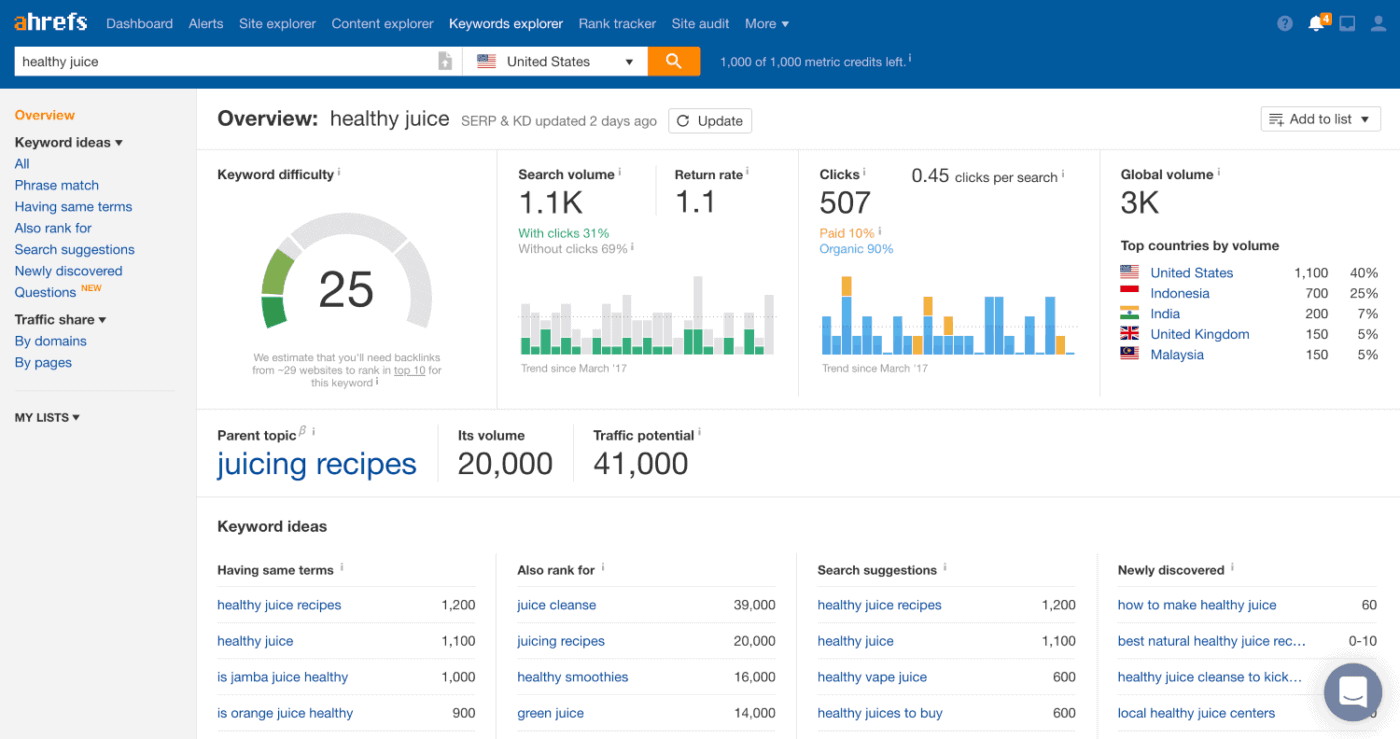
Like other tools mentioned here, Ahrefs will also give you a difficulty score to let you know how hard it would be to rank for a keyword, which helps you make smarter choices about the keywords you want to use.
One of the coolest features of Ahrefs is its content explorer. When you put a keyword into the tool, it will show you what content has performed best on social media, organic search, and in terms of the number of backlinks the content had.
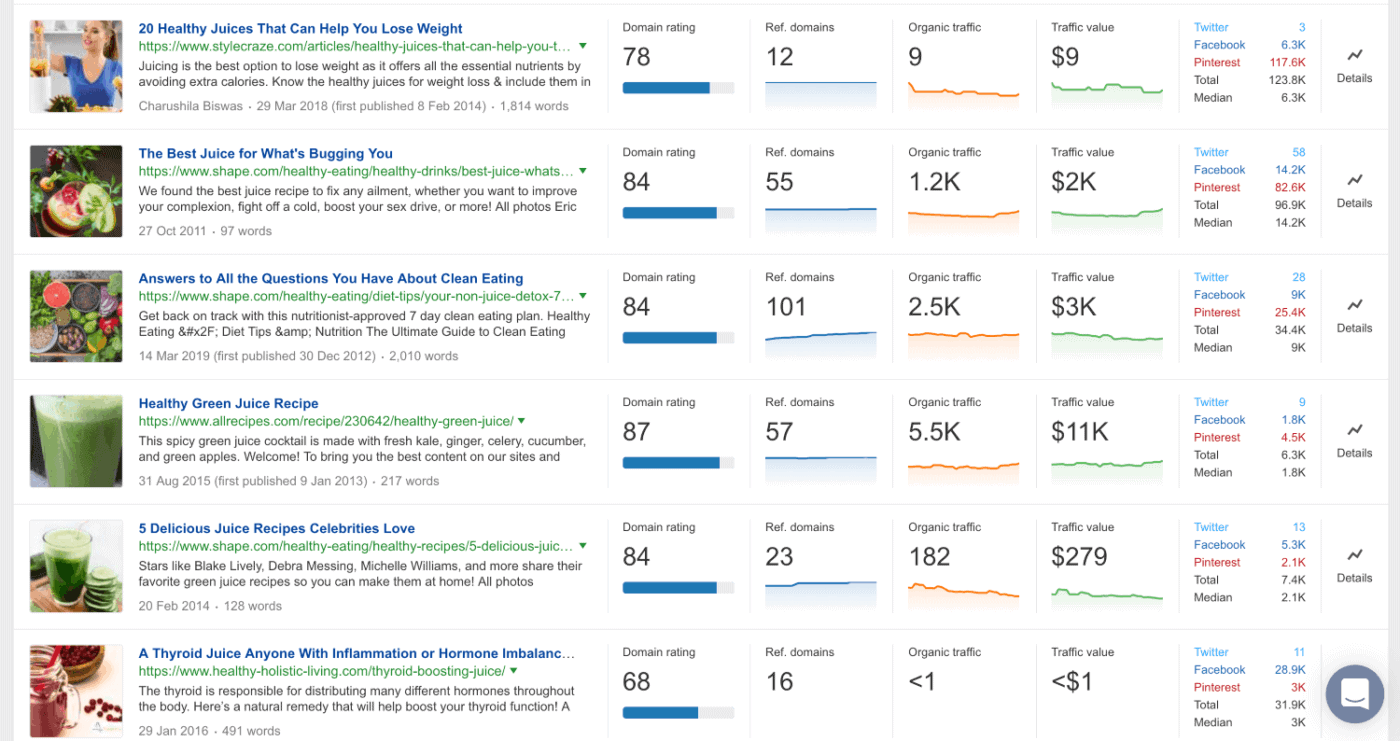
Ahref’s web monitoring tool is pretty neat too. It allows you to set up alerts for any keywords that are related to your blog.
Then, if someone mentions the keywords you want to rank for on their website, you’ll get an email notification with a link to the page. Think of it as Google Alerts for your preferred keywords, but better.
If you’d like even more in-depth info on keyword research, check out Ahrefs’s Beginner’s Guide to Keyword Research.
It covers everything you need to know about keyword research as a beginner, from how to find ideas, to how to analyze, target, and prioritize keywords, and more!!
This is a great (free!) article, whether you’re currently using Ahrefs or not. (And if you are using Ahrefs, this info will definitely help you maximize the money you’re spending on this tool!)
3. SEMRush
This is one of my favorites and one that we have personally been using for a couple of years now! Like many of the tools mentioned so far, SEMRush helps you…
- find related keywords
- find the right keywords that are appropriate for your target audience.
- get information on CPC and search volume
…BUT it also comes with a whole host of other features:
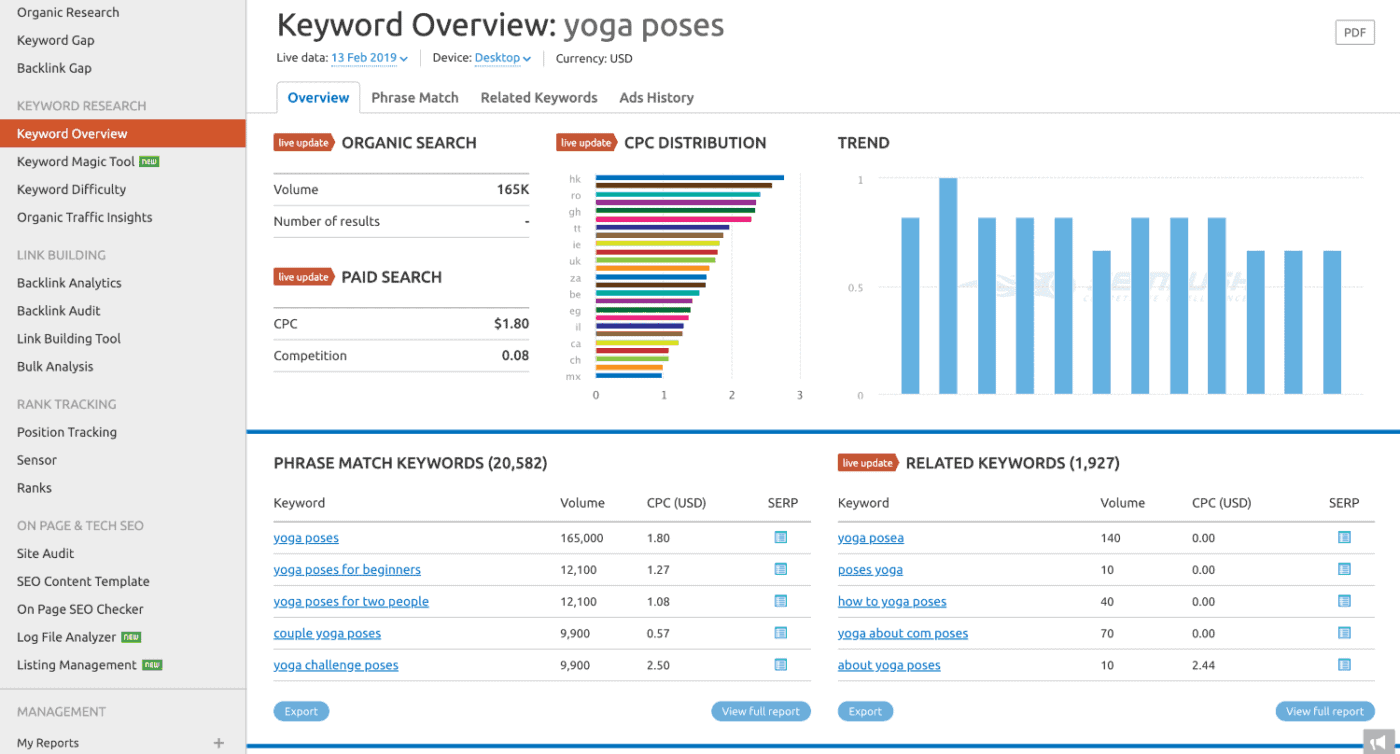
We personally use it a lot to track our domain authority and rankings for Google.
Every week, we get notifications from SEMrush on whether we have moved ahead or fallen behind our competitors in terms of domain rankings.
We also get emails when there are issues detected on our websites (broken links, 404 error pages, etc.) so that we can fix them before they hurt our rankings.
You can also conduct backlink analysis, gather long-tail keyword phrases, and get the best keyword ideas for your website. It has become a SUPER important tool in our business and growth.
It’s also pretty expensive, so if you’re choosing between this and Moz, we recommend SEMrush 100%.
4. Moz Keyword Explorer
Moz Keyword Explorer tells you…
- the monthly volume of the number of searches for the keyword,
- how hard it would be to rank in the top 10 spots for the keyword,
- the organic click-through rate (CTR),
- and sooo much more!
Here is an example with the keyword “cat costumes:”

They also give you a SERP analysis to spy on, errr, I mean see what other websites are ranking for keywords.
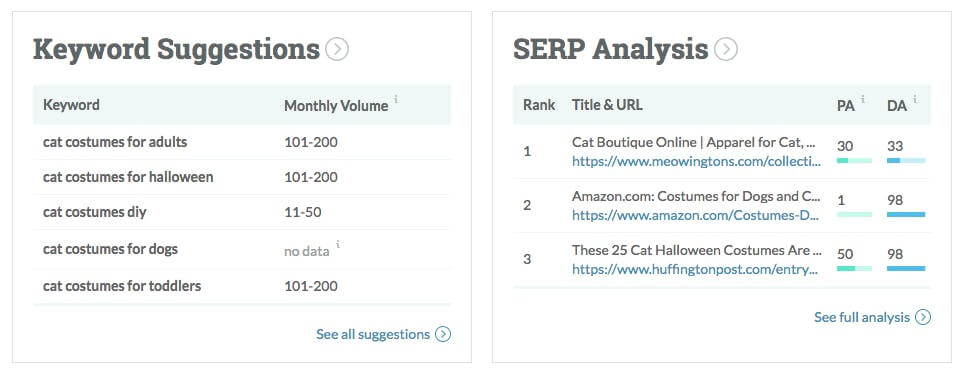
There are loads more bells and whistles in this tool, and it has a pretty hefty price tag accordingly. But if you can afford this tool and really learn how to use it to grow your business, it’s 100% worth it! You can try it out here.
And if it’s not in your price range at the moment, you can also check out their free SEO tools!
5. Keywords Everywhere
Keywords Everywhere is a free browser add-on for Chrome and Firefox that gives you an analysis of search volume, cost per click (CPC), and competition data of keywords on multiple websites.
Let’s say you search the phrase “dog training” on Google.
Before you even hit the “enter” key, you can view search volume, CPC, and competition data for that particular keyword or phrase!
This is how it would appear on your computer if you have the Keywords Everywhere addon installed:
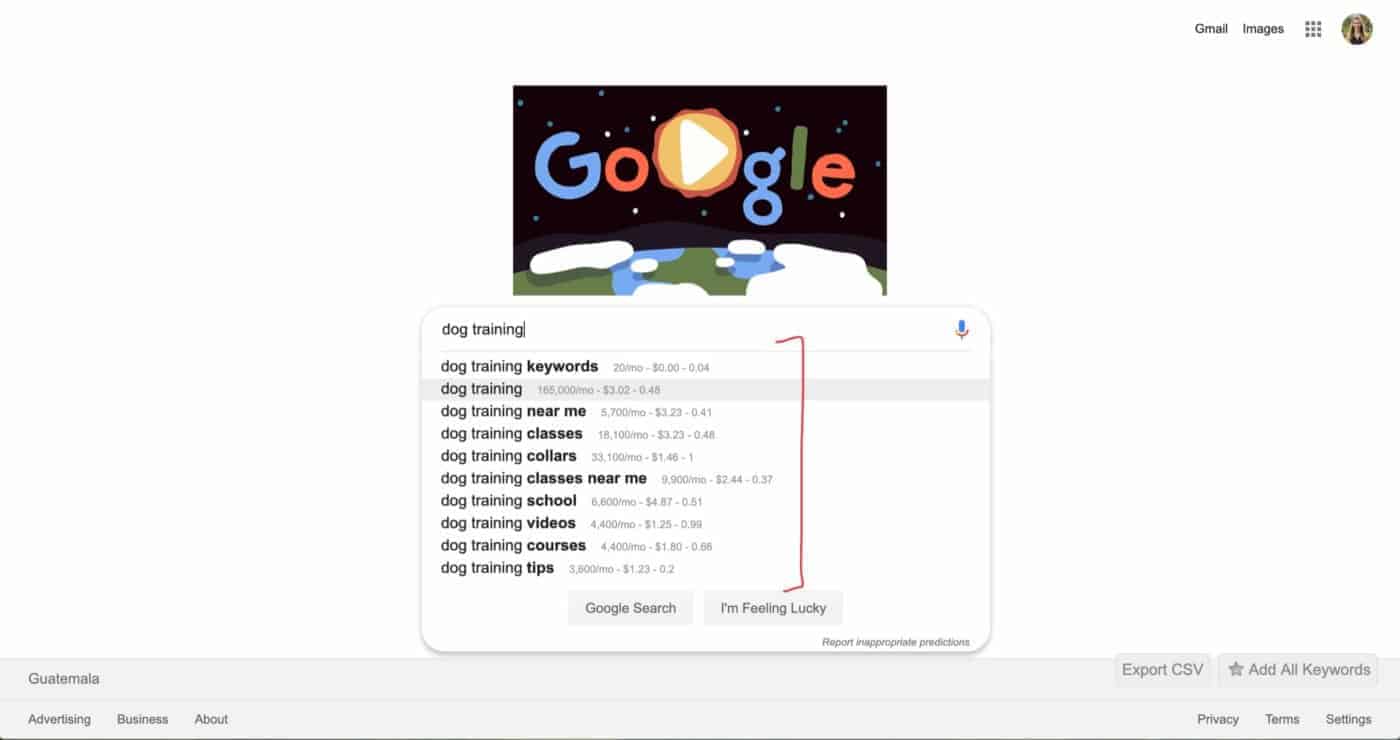
Once you hit enter, you can see more information about additional related keywords:
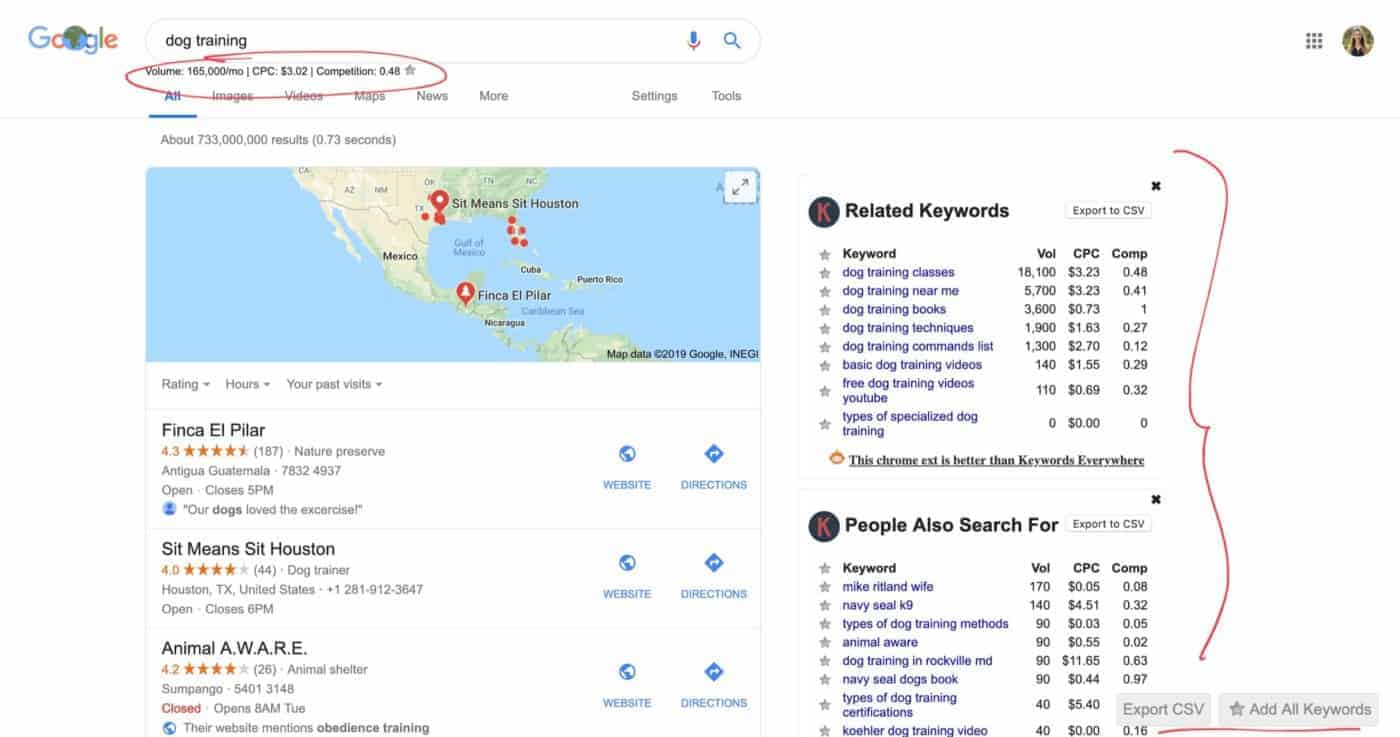
I love this tool because of how quick and easy it is to use!
You don’t have to visit any particular website or log in anywhere. You can also turn it on or off anytime you want in your extension settings. Just click the little K icon in the top right-hand corner of your browser and go to the settings.
You can install the Keywords Everywhere extension on your browser for free here.
6. Google Trends
With Google Trends, you can see what the world is searching for and find out related topics and queries as well.
You can see exactly WHERE in the world people are searching for WHAT topics.
Below are the results for the phrase “video games for kids” in the US vs Worldwide:
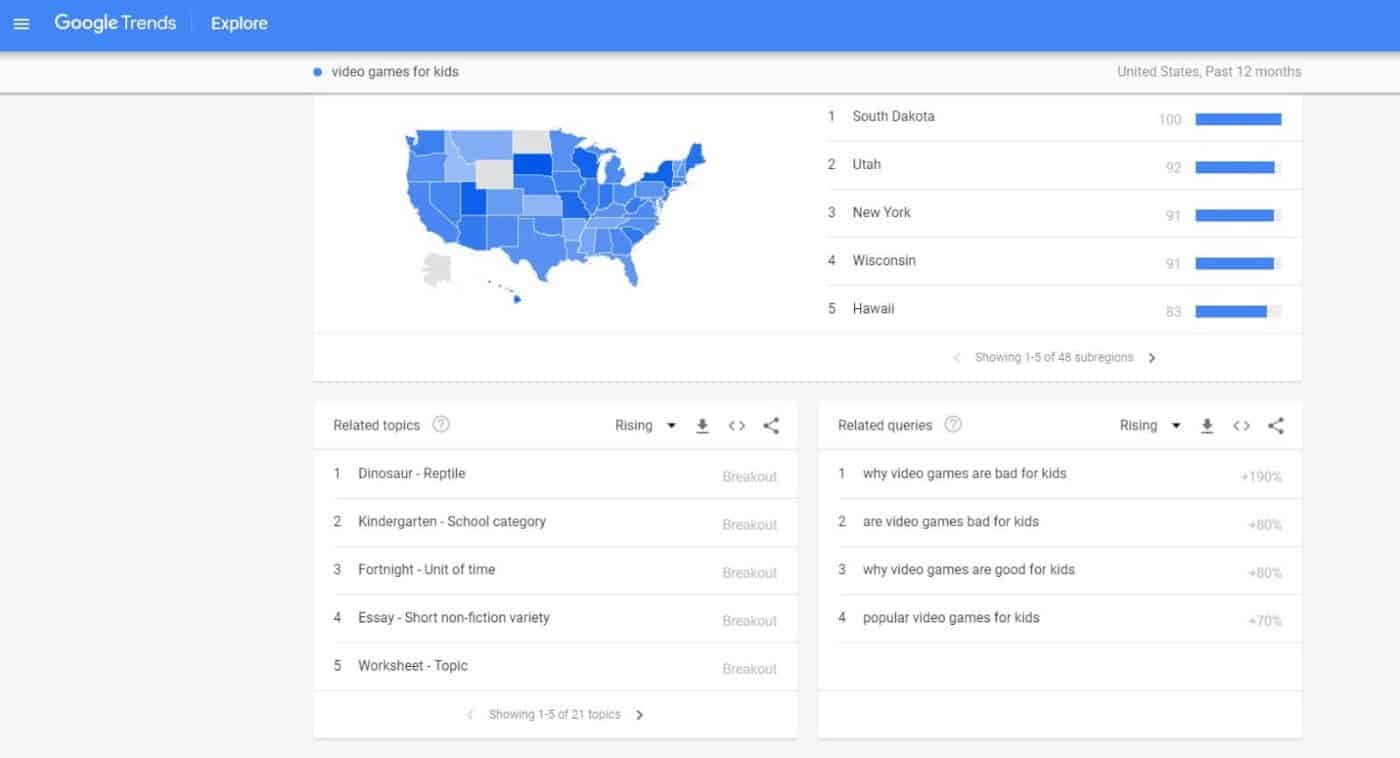
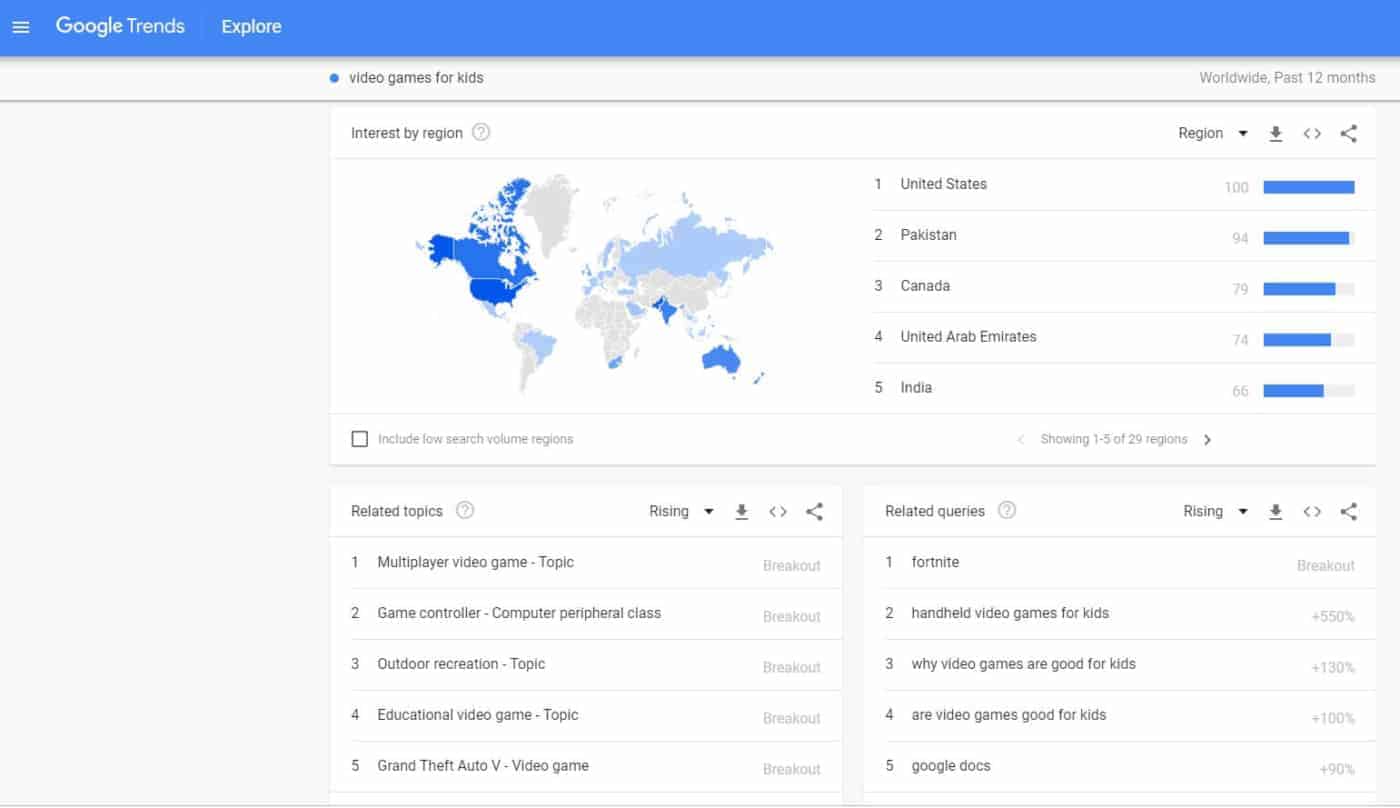
But perhaps one of my favorite features is…
Google Trends also tells you the interest over time of the keyword or phrase you’re searching This lets you know if the search is steady, climbing, or if interest is fading.
It’s great to write articles on trending topics because search volume can be higher than normal, BUT you would never want to hit the tail end of a trending topic because then you’re just wasting your time.
It can also just help with the timing of your post… For example, the graph below shows the search volume for “greek yogurt” over an 8-year period.
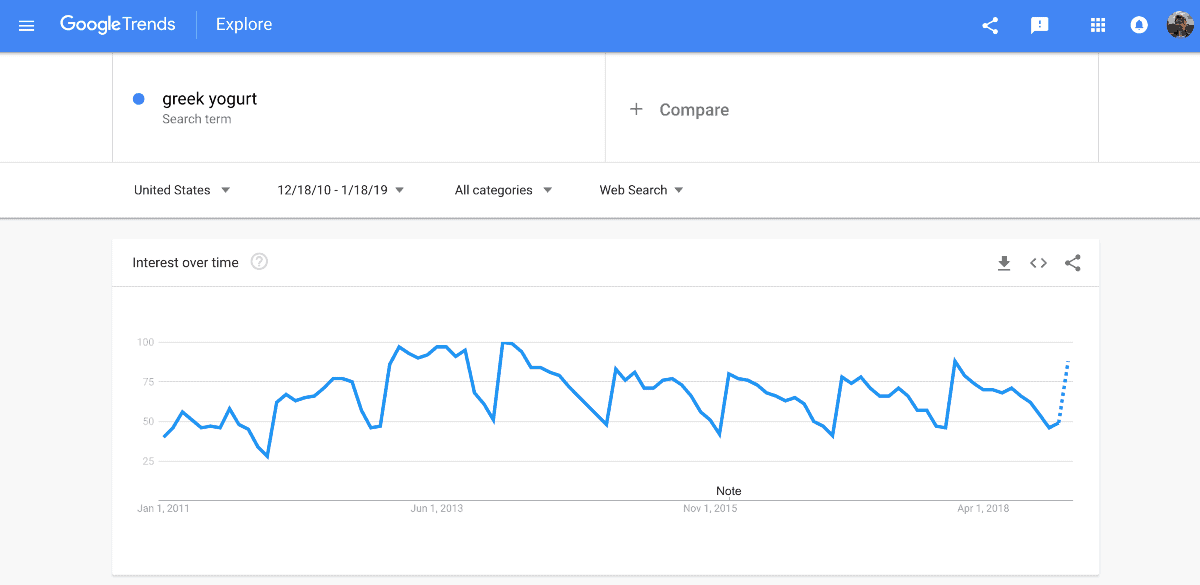
This graph shows us that there is a steady drop in searches for greek yogurt towards the end of the year and a huge jump at the beginning of every year. With this data, I can conclude that it’s probably a good idea to post a new article on this topic right at the beginning of the year when the search volume is highest!
Because there is no sense writing about greek yogurt in October when everyone is up to their eyeballs in searches for pumpkin-spiced EVERYTHING!
Am I right?
Throw a few ideas in Google Trends before you find a spot for them in your content calendar!
7. Long Tail PRO
Using longer-tail keywords can be a great strategy to get more Google SEO traffic.
Here are some examples to show the differences between short, medium, and long-tail keywords:
- Short-tail keyword: yoga-poses
- Medium-tail keyword: beginner-yoga-poses
- Long-tail keyword: beginner-yoga-poses-for-flexibility
Longer-tailed keywords generally have lower search volume but also lower competition.
Some people use the long-tail keyword strategy to create a bunch of content that has an easier chance of ranking (rather than creating fewer, more competitive articles that have a chance of getting higher traffic).
You can use Long Tail Pro to find these less competitive keywords
(That could hopefully translate to a boatload of high-converting traffic.)
When you type in a keyword like “home decor,” this tool will spit back related long-tail keywords that would be much easier to rank for on Google.
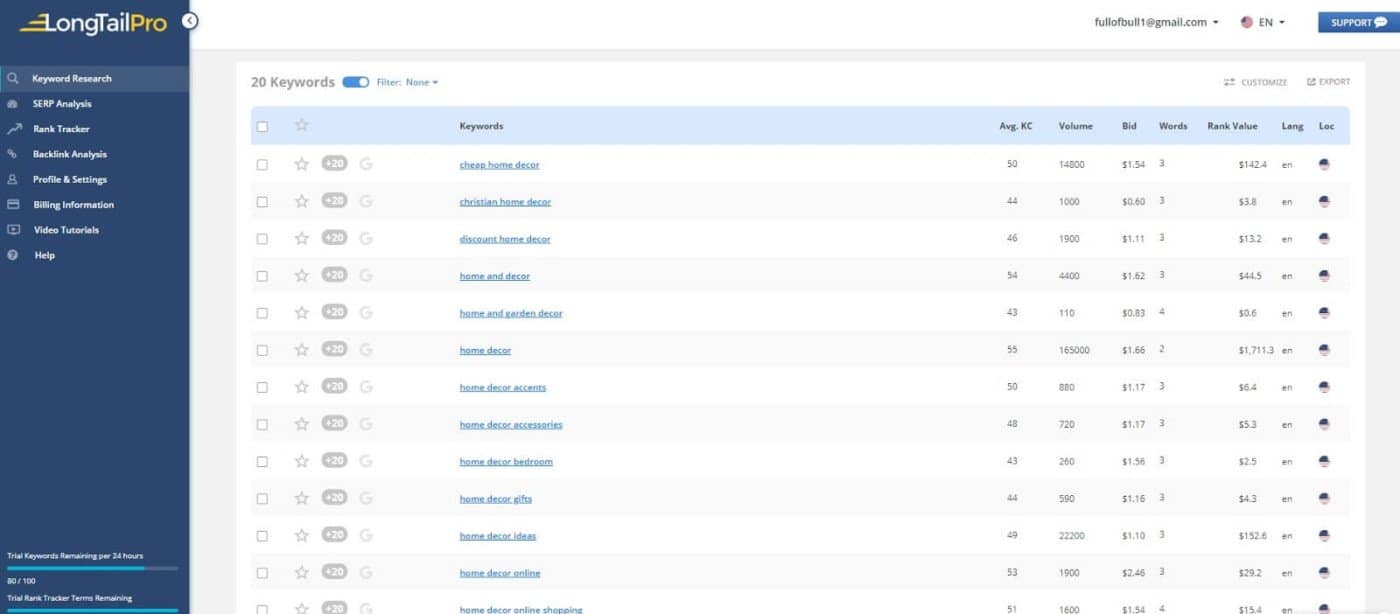
If you receive too many long-tail keywords, you can add filters to your limit results based on your average CPC bid, search volume, rank value, and more.
Long Tail Pro has a free 7-day trial if you want to test the various elements they offer as well.
8. Keyword Tool.io
So when you type something into Google, what happens?
Google usually starts trying to autocomplete what it thinks you’re searching for.
That can get really funny (or really awkward) depending on what you’re typing in…

That is the idea behind Keyword Tool, but it gives you MORE search suggestions (up to 20).
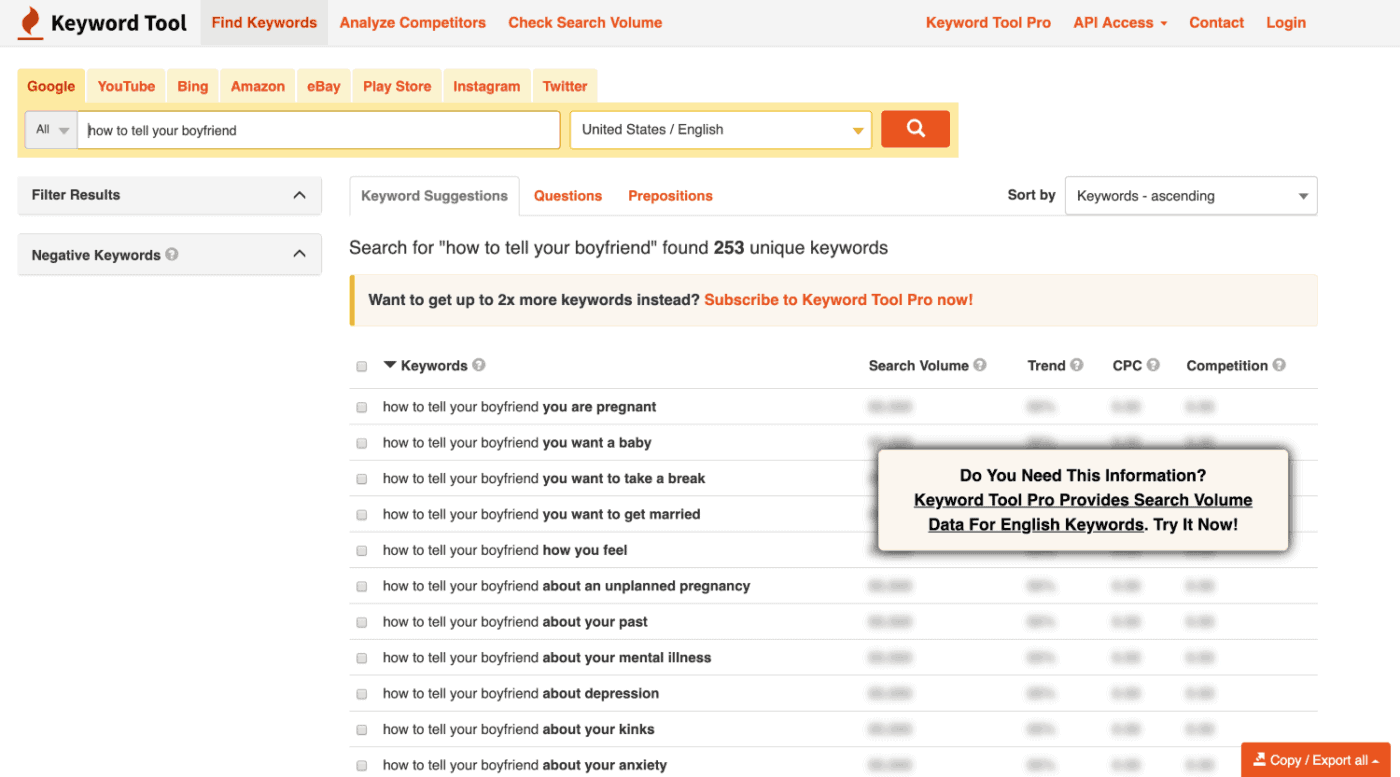
This is also a great tool to look for long-tail keywords as we explained with Long Tail Pro.
You can use this tool completely free, even without creating an account.
Or you can pay for their Pro version to unlock some additional features and which provides about double the amount of suggested keywords.
9. Pinterest Search
You’re probably thinking… “Say what!?”
That’s right!
Believe it or not, you can use Pinterest as a keyword research tool for bloggers simply by searching for words or phrases using their search feature.
If you’re using Pinterest to drive traffic to your blog, this is absolutely the FIRST place you should start!
When you type a word or phrase into the search bar (i.e. “baby diapers”), Pinterest will suggest related keywords based on popular user searches on the platform.
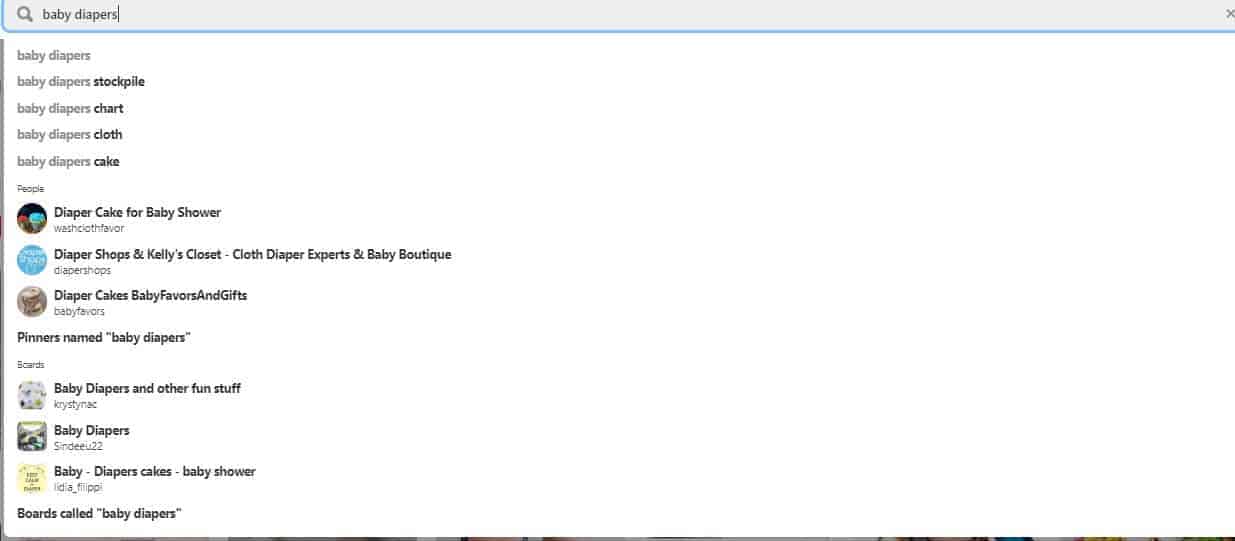
Then, if you click on one of the related keywords that Pinterest auto-populates (i.e. “baby diapers cloth”), it will suggest additional keyword ideas.

Let’s say you’re a mom blogger, and you’re looking for new keyword phrases to write about baby diapers.
In just a few minutes, you can find new ideas and keywords that people are actually LOOKING for to include in your blog content, leading to more organic page views.
What’s Pinterest SEO?
Basically what we just talked about. It’s just strategically using keywords that you know people are searching for because it will help your content get found in search more.
In the example below, I typed in “healthy recipes,” and was given six popular keywords that people are looking for on Pinterest.
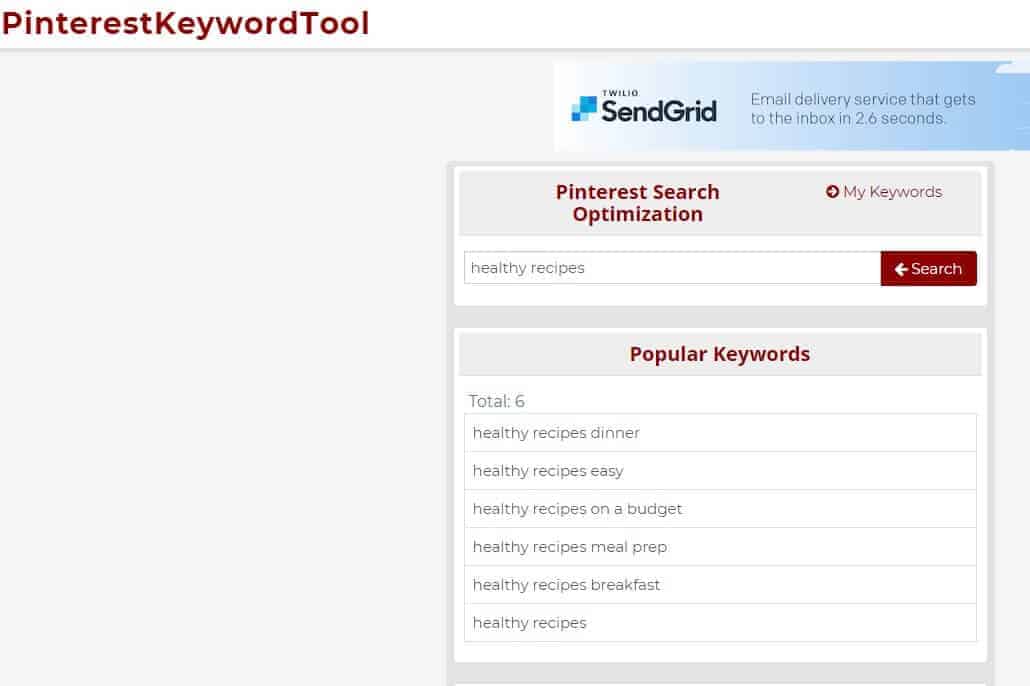
If you’re a blogger driving traffic with Pinterest, learning these popular keywords is invaluable to your content planning strategy!
10. Google Search Console
In order to get site traffic and performance data from Google Search Console, you’ll need to first verify your website.
After your site is verified, you can start monitoring your site’s performance in search:
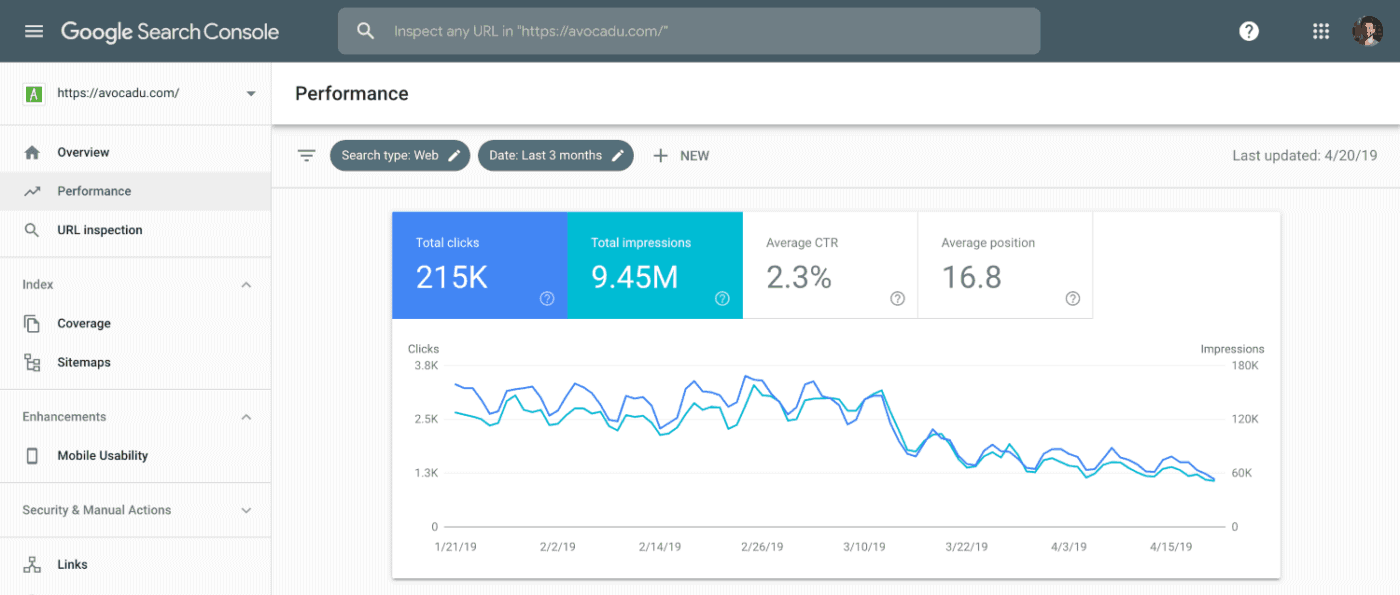
The Google overlords also will tell you which search terms and phrases bring up your content in search, which can help you come up with similar or better content to boost your rankings!
It can also help you create sales-centered content so that you can use certain articles to drive more traffic to your paid products (affiliates or your own).
More on that in our full guide on how to make money blogging.
You can also see mobile coverage and issues:
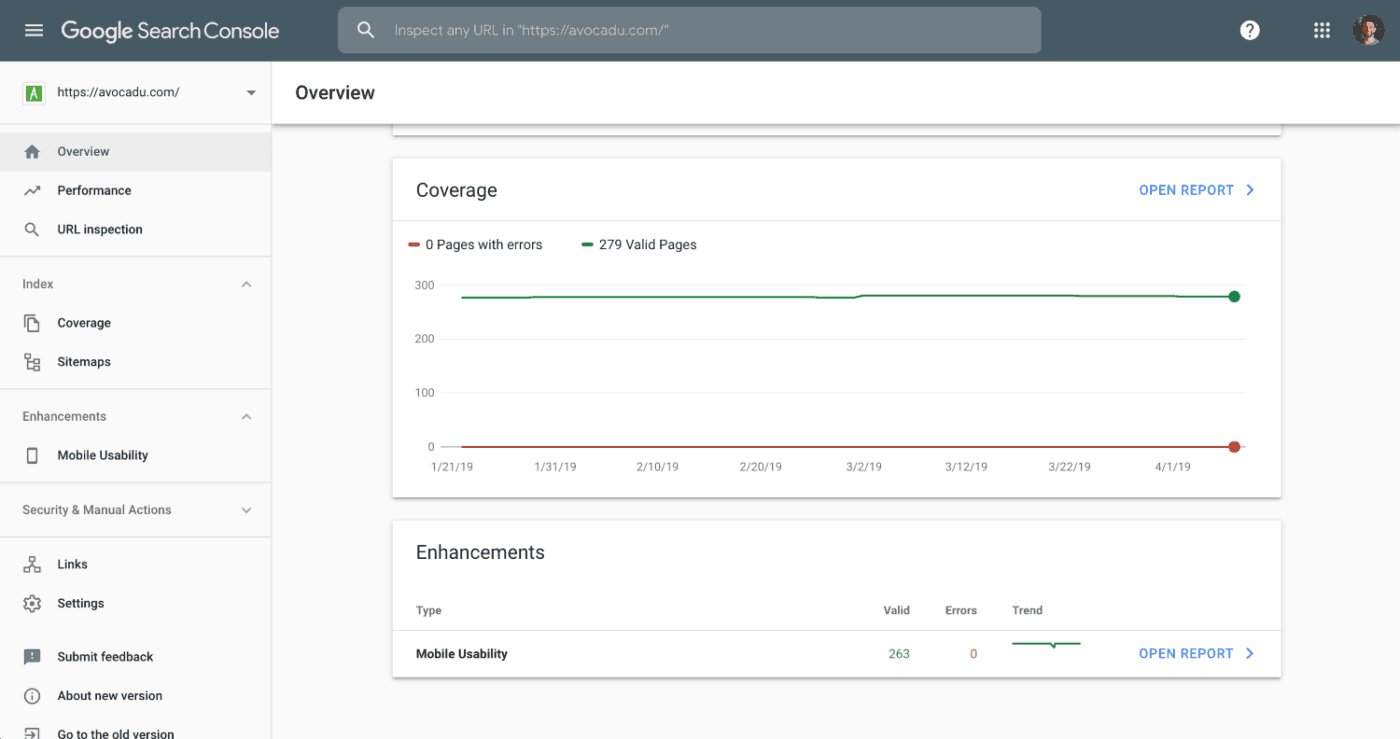
Google will also alert you via email when new issues are detected so that you can fix them ASAP and make sure they don’t affect your rankings!
So if you haven’t verified your website with Google Search Console yet, you should do so now!
11. Answer the Public
I know what you’re thinking, the old man that appears on the homepage is sort of… okay very… creepy.

But, This tool will provide you with NUMEROUS keyword suggestions in a unique organization that makes them VERY easy to utilize.
Honestly, The organization of Answer The Public’s results is the most valuable part of using this keyword planner.
While you could probably find similar keyword results on any of the keyword tools I mentioned already, it’s the way ATP delivers their results that make it an awesome keyword tool.
ATP delivers results for your chosen keyword by using 5 different categories.
- Questions
- Prepositions
- Comparisons
- Alphabeticals
- Related
After inputting your chosen term, these categories will fill with results in a very visual, easy-to-digest, manner.
Then, breaking them down further, it will divide the suggestions into specific categories within those 5 categories.
It makes the process of deciding how you’re going to use your keyword as simple as possible.
And you get your results in a perfectly organized, flower-like, flurry of suggestions:

This tool is crazy quick, super simple, and with the variety of suggestions it gives you in an organized manner, it can really get you out of a rut if you’re experiencing keyword research frustration.
Which Free and Paid Keyword Tools for Bloggers Are Right For You?
As you can see, there are a ton of different keyword research tools for bloggers out there, all with different features, functionality, and price tags!
Here are our personal favorites that we use regularly in our business:
- Paid: Ahrefs
- Paid: SEMrush
- Free: Pinterest
- Free: Ubersuggest
- Free: Google Search Console
We use all of these tools regularly when we are planning out and writing content for our blogs!
A few of the paid tools offer free trials, so I would suggest testing them out and seeing which one best meets your needs!
But even if you use just one of these keyword tools for bloggers, you’ll be that much closer to boosting your search engine rankings and getting MORE traffic to your blog!
Read Next:
Are you currently using any of these keyword research tools or do you plan to try one out? Did we miss one? Or just want to tell us that you loved the article!?
Please leave us a comment below! We’d love to hear from you!
Great resource about keyword research tools. Thanks for sharing with us. Do you have any resource about local SEO?
We haven’t played around with local SEO, but I know that Moz has a local SEO resource on their website.
Thanks for the great search ideas!!
You are so welcome!
Awesome article thanks for this article
You are so welcome!
Just getting started. Plan on using A lot of ur information and free course to further expand my knowledge. Thank u for all the effort in organizing this content.
You are so welcome!
Awesome article thanks yarr
Glad you enjoyed it!
Hi this is good. But you don’t explain how to then implement these key words into our content… like the dog walking for example, do I use the most popular key word or phrase in the heading or in the sentence ? And how many do we use per blog post? Thanks
Hey Danielle. We go into more SEO detail in another blog post. Click on the Grow tab in the menu, then click on the article “Ranking Blog Posts”
Such incredibly valuable information. I can’t thank you enough for all your hard work. Just getting my blog going and this made it easier.
Great to hear!
Awesome post!
Oh and for some reason #2 on the table of contents wasn’t working for me, figured i’d let ya know 🙂
Hey Thomas. That’s strange. I just tested it out and it worked for me.
Hello! Awesome content. Thank you for that! Just an update, Keywords Everywhere is no longer free 🙁
Hey Natalie. Thanks for the reminder about Keywords Everywhere. We need to get that updated on the blog post 🙂
Hey Alex & Lauren,
Your content is awesome! Thank you for sharing!
Greetings from Germany
Jannik
Thanks, Jannik!
Big fan of your blog, your strategies and your Pinterest techniques
And thanks for sharing this kind of great content and special thanks for morivation that I get from your blog
So my question is, I have a website which I want to rank on bing.
is there any good keyword research tool which I can use to get specific keyword volume and difficulty for bing search engine??
it would be really nice, if you will help me with this.
Hey Vijay. Our focus has been Google SEO, so I don’t have anything to recommend for Bing keyword search volumes. Ironically, a quick Google search on the subject brought up this website: https://www.bing.com/toolbox/keywords …I do not have any experience with it to give a recommendation.
I love your content am a marketer just in the game for about 2 months know and loving it…….
Awesome!
Great topic. I recently started implementing more keywords strategy. In fact, I have been able to use a strategy called the Keyword Golden Ratio which helps rank for certain low competition terms. The KGR strategy was developed by Doug Cunnington of Niche Site project (I have no affiliation, just recommending). Almost every article I have written using KGR has shown up on the first two pages of Google using this strategy. It is a great way to start getting Google SEO traffic to your blog right away (in addition to Pinterest of course)
Thanks for another great article! 🙂
Thanks for sharing what works for you, Nick!
I think Ubersuggest is heavily underrated. Not only can you find out how easy it is to rank for a keyword. But you can also perform a ‘site audit’ to find any SEO issues with your website.
As well as using the backlinks tab to start with your backlinking strategies. Another cool feature of Ubersuggest which I have seen Buzzsumo provide is content ideas. You can look up keywords to find popular posts on that topic. It even has how many times its been shared on social platforms like Facebook & Pinterest.
So Ubersuggest is slowly providing features that the big boys provide, all for free.
Thanks for your insight, John!
Hey Alex & Lauren,
thanks for this awesome post. I really enjoyed it.
Could you please tell me what is your conversion rates on the free “How To Monetize Your Blog” that is in the bottom of this post?
I myself started collecting emails with FREE courses, but since switching from a free PDF to courses my conversion rate dropped from 5% to 1% :(. (The amount of visitors in relation to signups through your free course)
Please tell me. It would make me more confident in my strategy.
Thank you.
Conversion rates are always something to approve on! Anything above 1% is great, so keep it up!
Thank you, Alex & Lauren, for sharing this post! I am going to implement this on my blog right away! I can’t tell you both how hard I have worked to start up my blog and it is because of you both that I am pursuing this new found passion:) I just wanted to say thank you!
Great to hear, Tyler!
Thanks so much for sharing this list! I’m focusing on improving my SEO for Q2 and this list will definitely help!
Great!
Super helpful guys! Thank you, thank you! Keep killing it!
Thanks, Charlesa!
Ahh this is a great roundup post! I love using Pinterest, keywords everywhere, ubersuggest and if I could add one more to the list it would be Answer the Public! Thank so much for sharing this- pinning to share!
Hey Lindsey! Great suggestion! Thanks for sharing 🙂
Hey Lindsey! Just wanted to let you know we added Answer the Public to the post 🙂
Hi Folks, wondering if there is a technical problem with your page or some misstep on my part. I’ve tried to sign up for the free 5 day bootcamp a week ago but no info from you. Best, Peter (with another e-mail below)
Hey Peter. Send us an email at theteam@createandgo.com along with the email address you used to sign up for the course and we’ll get it checked out.